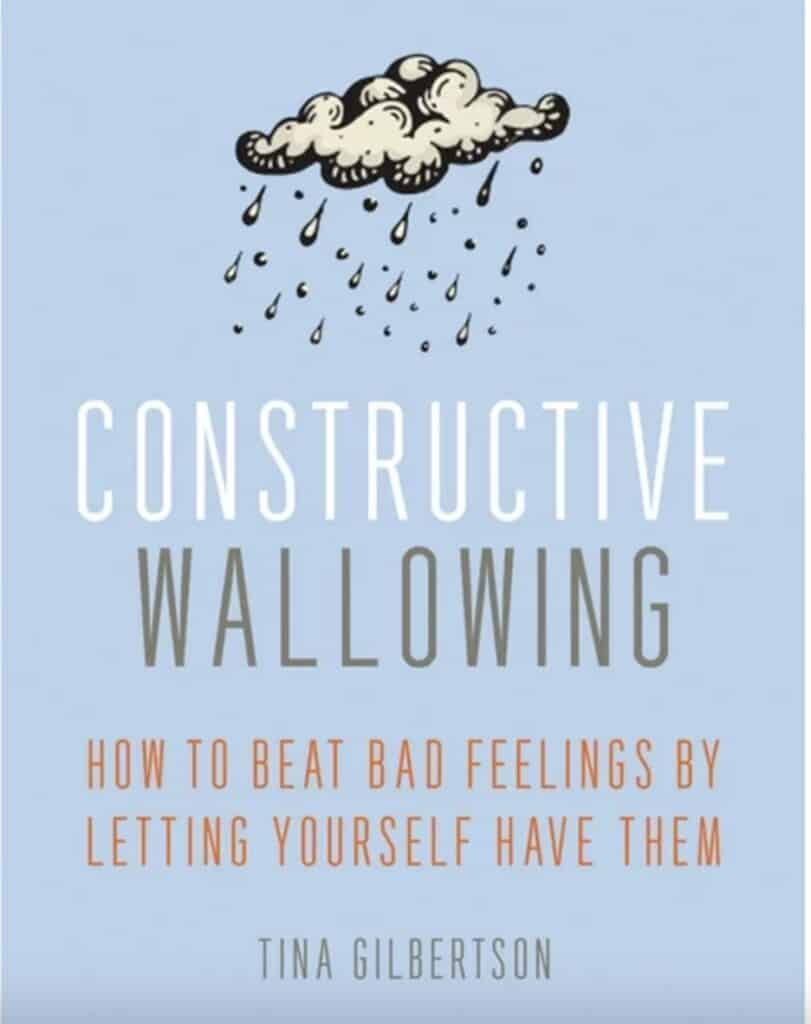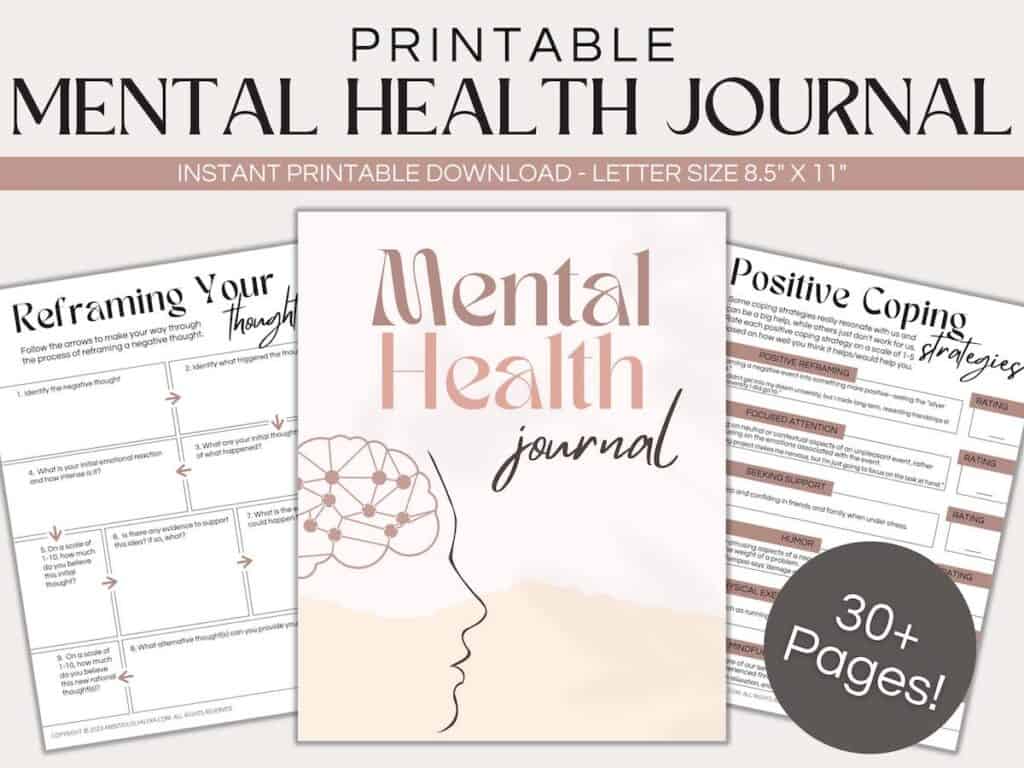Why Wallowing In Sadness Is Actually Completely Necessary
This post contains affiliate links and I may receive a small commission (at no extra cost to you) if you sign up or purchase products or services mentioned. Read the full disclosure here.
Last Updated on June 25, 2023
In a world of distracting ourselves from our emotions, needing to be “on” all the time, and toxic positivity (more on that later), it’s no surprise that we’re conditioned to suppress our emotions. Wallowing in sadness is probably the last thing you’ve been trained to do.
Some studies show that suppressing your emotions results in significantly higher distress. If you get into the habit of regularly suppressing your emotions, you may feel fine in the short-term. But never addressing the root of your emotions and their causes leads to unhealthy coping patterns.
In short, don’t bottle up those emotions!
To put it bluntly, wallowing in your sadness is absolutely something you should do. This doesn’t mean ruminating or dwelling on the negative to excess, but it certainly means giving yourself time to be sad and down.
Don’t ignore. Don’t suppress. Instead, I’ll explain the benefits of accepting your emotions and allowing yourself to fully experience them.
This post is all about wallowing in sadness.
First, what is toxic positivity, why is it bad, and how does it connect to wallowing in sadness?
“Toxic positivity” is the belief that we should always have a positive mindset, even if it negatively interferes with dealing with emotional pain or a difficult situation.
Healthline states, “positivity can also become harmful when it’s insincere, forceful, or delegitimizes real feelings of anxiety, fear, sadness, or hardship.”
Have you ever heard “at least it’s not as bad as (insert worst case scenario)!” or “just be grateful, others have it worse!”?
These examples of toxic positivity are dismissive of others’ emotions and experiences. It puts people under pressure to maintain an appearance of “happiness.”
But sadness is something we ALL experience. How strange is it that we get uncomfortable when we acknowledge a natural, common emotion? That our first instinct is to divert the narrative to something less “negative”?
This all contributes to the stigma surrounding mental health. It’s why “wallowing in sadness” is typically frowned upon in society. But it shouldn’t be. It’s very necessary to accept your emotions.
Hey, are you struggling with your mental health? Or just want to get better at tackling life’s daily stressors? Talking to an online therapist can really help you out. I always recommend Online Therapy because it’s a comprehensive, effective online therapy toolkit based on CBT (cognitive behavioral therapy–the leading standard in psychotherapy) at an affordable monthly cost.
Letting sadness happen will help you move on sooner
Giving your emotions your full attention when they are causing you distress won’t make them worse. In fact, ignoring your emotions is what will worsen and prolong them. They will always crop up at another time if they aren’t dealt with.
So, distracting yourself in an effort to feel happy in the short-term can backfire.
Instead, admit when you feel sad and accept yourself during these times. You can even say, in your head or in a journal, “I’m feeling sad right now. This response makes sense given the circumstances. I’m going to give myself the time to experience this feeling.”
Getting into this habit of validation will help you deal with emotions in a healthier way. Don’t judge yourself for feeling a certain way, just accept it!
Did you know that I offer a printable mental health journal that will help you accept your emotions and reframe negative thought patterns?
As someone who’s always looking for ways to approach my emotions healthily and turn my negative thoughts into rational ones, I knew just how important it was to create a resource that will actually help you understand your inner-dialogue and coping habits.
Go check it out and see the printable mental health journal for yourself!
It gives you a break from being “on” all the time
If you are constantly putting on a happy face, you’ll never give yourself the time to check-out from the world and focus on healing.
And if you’re really busy and spend a lot of time needing to put your emotions to the side (work, school, errands), I totally get it. I have days where I intended to journal and address my emotions, but the night rolls around and I realize I didn’t make that necessary time for myself.
And then what happens? That’s right–you lie awake at night, alone with your thoughts and pent-up emotions that NEED to be expressed!
Don’t do that. Make the time for yourself. You must give yourself a break from being “on” all the time, or things will catch up with you sooner or later.
(And usually at the worst time in the form of a breakdown!)
It strengthens your self-compassion
If you stop beating yourself up for being human and having normal human emotions, you’ll give yourself the compassion you deserve.
Letting yourself experience negative emotions, engage in accepting self-talk, and understand that what you feel is valid all contribute to strengthening your self-compassion.
There’s a book that outlines this exact concept–Constructive Wallowing by psychologist Tina Gilbertson.
She explains “wait a minute; is it really so terrible to give ourselves a time-out to feel our feelings? Or is it possible that wallowing is an act of loving kindness, right when we need it most?”

This book is all about embracing your emotions and heading toward the direction of self-compassion to improve your emotional health. An excellent read for understanding the benefits of letting yourself wallow!
It helps you unlearn unhealthy coping habits from childhood
Some people were raised on the idea that expressing your emotions isn’t okay. This leads you to be afraid of your emotions, or potentially believe that emotions aren’t safe, or somehow wrong.
But research has shown that this form of “experiential avoidance” (ignoring or suppressing your emotions) correlates with cardiovascular distress. It’s clear that there’s both emotional AND physiological consequences for suppressing your emotions.
If you were used to suppressing your emotions growing up and you internalize your problems as a result, the first step is recognizing that and giving yourself the permission to wallow as needed.
Refusing to wallow isn’t much different than leaving something physical, like a broken bone, unattended.
Take wallowing in sadness at a natural pace. Don’t set time limits.
You can’t rush the process of dealing with your emotions. For example, would you give yourself 24 hours to feel sad about a breakup and expect yourself to be perfectly fine when the 24 hours are up?
No!
If you wallow constructively, the sadness will have a natural end to it that falls in line with your needs. But depending on the intensity of your emotions and the circumstances that got you there, the time it takes to “let it all out” will vary.
Listen to your body and your brain and let your emotions come and go organically.
Final note: just be careful not to ruminate
With all of that said, make sure you really are wallowing constructively and not excessively dwelling on the subject matter.
When I’m sad, I like to search up Reddit threads to find others in the same situation as me (it might sound cringey but it really helps!). It helps me feel better to know that other people are sharing my experience.
But I have to be realistic and stop myself after a few threads, or else I will go down the unproductive Google search rabbit hole. (Kind of like how it does more harm than good to Google your symptoms when you have a rash!)
So I’ll bask in the shared experiences I find online, then move onto crying it out, listening to sad songs (this actually has BIG benefits!), and journaling.
Check in with yourself often and be sure the actions you’re taking are actually helping you work through your emotions.
Remember that your emotions are valid. If you’re sad, you’re sad. Accept the wide range of emotions that are simply part of the human experience and don’t beat yourself up about it!
Always give yourself the time you need to work through your emotions and problems. This is SO much more productive than pushing them down only for unresolved feelings to show themselves again later.
It’s ok not to be ok.
IF YOU LIKED THIS POST, YOU’LL LOVE THESE TOO!
I Made a Printable Mental Health Journal…And It Will Change Your Coping Habits
Ultimate Self Care Weekend Ideas For Unwinding
65 Journal Prompts for Self Love to Empower Yourself
Ultimate List of Self Care Hobbies: 32 Ideas You’ve Gotta Try










Recognising and expressing our feelings is so valuable. But good reminder not to ruminate.
Yes! Just gotta be careful there!
Excellent post. It is so vital to acknowledge our emotions. You are right we are not always happy. There are moments we are sad… etc. But paying attention to how we feel and knowing how to express ourselves helps us to stay healthy. Thank you for sharing this important post.
Pastor Natalie
Letstakeaoment.com
Yes, very important for our mental health to know how to express ourselves!
Great post. Really appreciated all your points.
Pastor Natalie
Letstakeamoment.com
Thanks so much for such a validating post! It’s all a matter of balance. I mean, dialectical behavior therapy, which I used to do, taught me the ACCEPTS skill set, which basically revolves around distracting yourself. However, it also taught me that emotions have value and that pushing them away doesn’t help. Your post sheds some important light on that last bit. Wallowing is okay and even necessary, but like you say, ruminating can be dysfunctional.
That’s amazing you gained that insight from dialectical behavior therapy! I am a lot more knowledgeable on CBT, but am vaguely familiar with DBT too. It is absolutely about striking the proper balance of acknowledging and feeling out your emotions, but also not letting them reach the point of dysfunction by ruminating on them.
I agree 100%! I learned a long time ago the benefits of letting myself wallow. It’s better to feel all the feels so I can pick myself up after. I’ve also recently started Journaling again and that is so helpful in dealing with my emotions.
Yesss! Completely agree with you there on the journaling!
The reality of finding your inner peace is to except and express your feelings no matter the hardship, etc. One example is when you hear a parent say to their child “don’t cry” or “you’re bigger than that, we don’t cry” is disaterous. We can and have to express feelings not to the point we wallow in it with no end point, but it teaches us emotional intelligence to weather the storms through life.